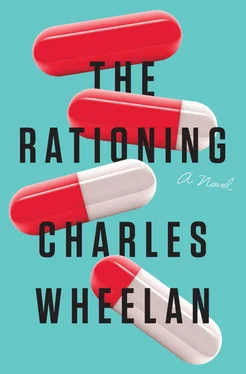“Exactly. Two things need to happen,” the National Security Adviser answered confidently. “The President needs to be there to sign the agreement. And we need to have some show of military presence in the disputed area to signal our collective resolve. Our allies feel—and I agree—that there is no substitute for an American carrier group clearly staking out international waters.”
“So we sail an aircraft carrier along the China coast?” the Speaker of the House asked indignantly.
“No, ma’am,” the National Security Adviser answered, not betraying any change in emotion. “We sail the carrier group through international waters that the Chinese government has heretofore illegally claimed to be their exclusive—”
“Okay, okay,” the Speaker said. “But we’re still talking about a big military pissing match over a bunch of islands in the South China Sea.”
“No, that is entirely wrong,” the President interjected. “This is an agreement we have been negotiating for twenty years. It covers everything from fishing rights to human trafficking. It is the cornerstone of our entire defense strategy in the region.”
The Secretary of Defense added, “I want to underscore what the President said on this. Our allies are counting on us to be the anchor of this agreement. China has not proved to be the responsible actor on the international stage that we had hoped. We need a multilateral effort to contain a variety of illegal and aggressive actions on their part.”
“I don’t even know what that means,” the Speaker said. “We’re talking about a bunch of uninhabited islands ten thousand miles from here.”
“We are talking about much more than that, ma’am,” the National Security Adviser said.
“Enough to let Americans die?” the Speaker asked. “We are unwilling to ask for the medicine that will save all those lives? That just feels like testosterone run amok.”
The President said, “If we back down on this, it will be Yalta all over again. We will pay a huge price in that part of the world—all over the world, actually—if we capitulate to Chinese aggression.”
The Speaker replied, “Yalta? You know what it feels like to me? Vietnam. Your team has some deluded notion that terrible things are going to happen if we don’t project strength thousands of miles from our borders. Are we willing to let tens of thousands of Americans die for that?”
The Senate Majority Leader, who normally sat impassively for these conversations, added, “Mr. President, I have to agree with the Speaker on this one. It would be awfully difficult to explain to my constituents back in Illinois that their loved ones are dying from a preventable disease because we’re trying to protect Vietnamese fishing rights. I can’t sell that to a Rotary Club.”
“You know this is about much more than Vietnamese fishing rights,” the President said sharply.
“I do,” the Majority Leader answered. “But that doesn’t mean I could sell it to a Rotary Club back home.”
“Here’s what you say,” the Strategist offered. “You tell them that you don’t think we should subvert America’s interests to an authoritarian regime for the next hundred years in order to save people who are likely to die soon anyway. You sprinkle in some historical references to the times when the democracies were too timid to stand up to authoritarian bullies. Then you finish with an overview of how the United States led a coalition of democracies that successfully contained the Soviet Union.”
“Maybe I’ll just have you give the talk,” the Majority Leader said, chuckling.
“This is a decision Congress should make,” the House Speaker said tartly.
The President waved the comment away with a dismissive sweep of his hand. “Congress will do whatever helps most in the midterm elections,” he said. “There is no long-term vision there. That’s why we don’t make military decisions in the legislature.”
“With respect, Mr. President, Congress will do what the American people want them to do,” the Speaker shot back.
The Strategist offered, “Roosevelt had to drag the country into World War II. We would have watched the Holocaust from afar if it weren’t for Pearl Harbor.”
“Let’s not pretend we’re dealing with the Holocaust here,” the Speaker said.
“I think the point is that popular opinion is not always a great gauge in these kinds of situations,” the Secretary of Defense interjected. “The South China Sea Agreement is very compelling. We’ve done it right. It has the backing of all our key allies. We have bipartisan support in the Senate—”
“Not if they know the price we have to pay,” the Majority Leader said.
“Obviously,” the Defense Secretary continued. “I’m just saying that if we are going to sit here tossing historical examples back and forth, this is not some unilateral muscle-flexing.”
“Like Iraq,” the President said.
“Correct. This is not Iraq. To the contrary, the world is looking to us on this one. They want us to lead in the region,” the Defense Secretary said.
“Can we just go back to India for a minute?” the President asked. “Because then we wouldn’t have the South China Sea problem.”
“We’ve hit a dead end there, sir,” the National Security Adviser said.
“I don’t understand that. The world’s biggest democracy—how are we not getting more help from them?” the President asked, almost pleading.
“The Prime Minister is in political trouble,” the National Security Adviser explained (though we had been over this ground before). “His coalition is breaking up. He thinks this would be political suicide for him. He cannot be seen as shipping medicine out of the country.”
“Saving hundreds of thousands of lives is bad politics?” the President replied in frustration.
“When we canceled the trade deal with India, it provoked enormous hostility there,” the Secretary of Defense answered. “We were their biggest export market. The perception is that the U.S. is indifferent to the country’s welfare.”
“What about the military angle?” the President asked. “We can revisit the Boeing deal.”
“Sir, we rejected that deal for sound reasons,” the Secretary of Defense answered, looking somewhat alarmed by the subject. “The Prime Minister has been very bellicose toward the Pakistanis. The Islamabad government is hanging by a string. Sending advanced fighters to India right now would destabilize the region. Pakistan is a nuclear power. The last thing we need—”
“Yeah, okay, I got it,” the President said. “You’re telling me we can’t do some kind of secret deal with Delhi? Send him money to a Swiss bank account if we have to.”
“That government is worse at keeping secrets than we are,” the Secretary of Defense said.
“Are we really talking about a Swiss bank account?” the Speaker asked. “Really?”
“It’s just an example, for fuck sake,” the President snarled. “But yes, now that I think about it, I would ship briefcases full of cash anywhere in the goddamn world if I could get the Dormigen without selling out our country to the Chinese.”
There was a brief lull in the conversation. The participants around the table instinctively looked to the President. “Give me something better,” he said.
PART 3

WHAT IF?
DURING OUR SHORT BREAK, THE HOUSE SPEAKER approached the President and told him she was prepared to force his hand on the China situation, either by congressional action or in the courts. Their conversation was calm enough that none of the rest of us even knew it was happening. The President calmly rebuffed her. Congress has no authority to conduct diplomacy, he said. The White House Legal Counsel joined their sidebar conversation. “You have no grounds for action in the courts, either,” he pointed out. “You can sue the President to stop him from doing something—if he were giving away American Dormigen, for example. But you can’t sue to make him do something, at least not in this case.”
Читать дальше













